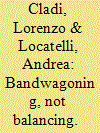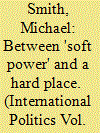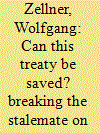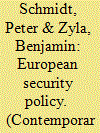|
|
|
Sort Order |
|
|
|
Items / Page
|
|
|
|
|
|
|
| Srl | Item |
| 1 |
ID:
114822


|
|
|
|
|
| Publication |
2012.
|
| Summary/Abstract |
Although realist perspectives seem challenged to explain European choices and preferences, realism retains great utility with its stress on states and states' concern for their national interests. Traditional realist analysis of European security policy err, rather, by focusing on balancing and related concepts such as soft balancing and balancing for autonomy. These accounts are theoretically and empirically flawed. Whilst balancing perspectives shed some light on European security policy predispositions, bandwagoning better explains trans-Atlantic contemporary security cooperation and increases the explanatory power of realist theories. The case for European bandwagoning is illustrated here by the empirical experience of prominent European Union military initiatives and the French defence reforms in the post-Cold War period. The tendency to bandwagon shows that European attempts to increase capabilities are strengthening rather than weakening transatlantic ties. Contrary to dominant realist views, through bandwagoning NATO benefits from European security and defence policy, becoming more durable and stronger than traditional realism expects.
|
|
|
|
|
|
|
|
|
|
|
|
|
|
|
|
| 2 |
ID:
089818


|
|
|
|
|
| Publication |
2009.
|
| Summary/Abstract |
This paper explores the pressures operating on European Union Foreign and Security Policy in the 'triangle of forces' created by the European integration process, developments in the Islamic world and the responses of the United States. In the first section, the paper explores ideas about foreign policy and power in the European Union (EU), as exemplified in debates about the Lisbon Treaty and the future role of the Union. The second part of the paper sets out three logics inherent in the development of the Common Foreign and Security Policy, distinguishing between the 'internal' logic of the European integration process, the 'external' logic reflecting the opportunity structure in the world arena, which creates challenges and opportunities for the EU and its Member States, and the 'identity' logic, which creates a move towards self-realisation and 'self-recognition' on the part of the EU in international politics, and relates this to recent developments in European foreign and security policy. The paper then argues that the multi-dimensional 'triangle of forces' between European integration, the Islamic world and the United States has played a key role in focusing these developments, by posing challenges to the three logics and creating complex linkages between them. The Conclusion asks whether as a result EU foreign policy has been 'catalysed' (given new impetus and direction) or 'constrained' (subject to a process of external or self-limitation), and points to some early indications of the impact of the Obama Administration in the United States.
|
|
|
|
|
|
|
|
|
|
|
|
|
|
|
|
| 3 |
ID:
091399


|
|
|
|
|
| Publication |
2009.
|
| Summary/Abstract |
Overshadowed by more pressing issues-Afghanistan, Iraq, Iran, and global terrorism-European security relations with Russia have deteriorated dramatically since the late 1990s. Over the last 10 years, European security policy has been increasingly dominated by unilateral and frequently confrontational approaches.
|
|
|
|
|
|
|
|
|
|
|
|
|
|
|
|
| 4 |
ID:
111976


|
|
|
| 5 |
ID:
108774


|
|
|
|
|
| Publication |
2011.
|
| Summary/Abstract |
With the Lisbon Treaty in place and the European Union increasingly involved in crisis management and stabilization in places near and far, this Special Issue examines whether European security behaviour is evidence of an actual strategic culture. Contrary to prevailing scholarship on the subject, this volume demonstrates that strategic culture, as an analytical tool and force on European strategic goals and conduct, is far from conclusive. Ostensibly, the development of a security culture was a major lever by which the European Union's principal planning document, the European Security Strategy of 2003, tried to guide the European Union's role in international security. This volume revisits the trajectory of the concept of strategic culture and examines its application in a variety of circumstances, especially operations in Africa and the Balkans, including joint operations with NATO and the United Nations. The contributors to this Special Issue find that strategic culture is a useful tool to understand EU's operations, not in the sense of a 'cause', but as a uniquely European normative framework of preferences and constraints. Classical notions of strategic culture must be adapted to highlight the specific evolution of Europe's strategic culture. Though at variance over the extent to which security and defense missions have promoted a shared strategic culture in Europe, the authors in this Special Issue reveal a growing sense that a strategic culture is critical for European ambition as a global actor. Should Europe fail to nurture a shared strategic culture, its ambitions and the normative framework that underpins it will unravel.
|
|
|
|
|
|
|
|
|
|
|
|
|
|
|
|
| 6 |
ID:
138869


|
|
|
|
|
| Summary/Abstract |
The growth of European Union (EU) competences in the field of external security in the last decade has produced a substantial increase in the number of EU institutions and bureaucratic actors engaged in the planning and management of these policies. Moreover, the expansion of competences in such a sovereign sensitive area comes up against the persistent tergovernmental nature of the security sector. This has resulted, on the one hand, in a complex institutional architecture with heavy demands in terms of coordination, and on the other hand, in a stark differentiation and stratification of the legal regimes with a potential to impact on policy outcomes. This state of uncertainty is particularly relevant when looking at relations with countries bordering the Union, as the long-standing web of interactions there has developed a more complex institutional environment. While most of the scholarly literature focuses on single institutional sectors or policies (Common Security and Defence Policy, European Neighbourhood Policy, or the external side of the Area of Freedom, Security and Justice), this study seeks to address the issue with a comprehensive analysis of the institutional framework that has emerged in the last decade, more notably, since the entry into force of the Treaty of Lisbon. The article provides, first, an overview of the EU’s institutional actors responsible for security policies in the regions bordering the EU, and second, an examination of the different mechanisms established to address the coordination issue. Finally, this study will argue that the traditional military dimension is but one, and certainly not the most developed, of the security instruments employed by the EU. At another level, it will be argued that the shift of focus from the military to other security tools has altered the institutional balance in the security sector, substantially adding to the relative influential weight of the Commission.
|
|
|
|
|
|
|
|
|
|
|
|
|
|
|
|
|
|
|
|
|